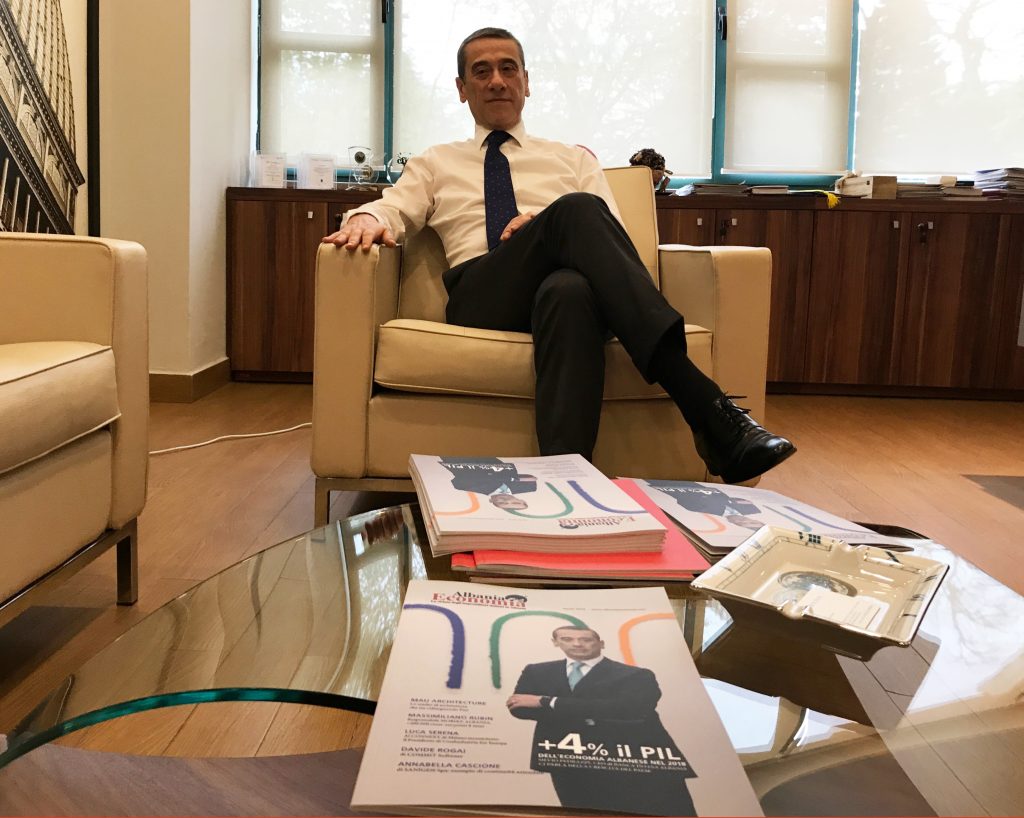
Interview with the General Director of Intesa Sanpaolo Bank Albania, Mr. Silvio Pedrazzi, given to the Director of the National News Agency NOA, Edison Kurani
The General Manager of Intesa Sanpaolo Bank Albania, Mr. Silvio Pedrazzi, in an interview for the NOA Albanian News Agency, dwells on the latest developments in the Albanian banking sektor. Pedrazzi comments on the constant flight of foreign banks from Albania and estimates that banking groups try to focus on "key markets", moving away from those markets where they consider themselves "complementary". He says he understands the disappointment of the Greek government and the business of this country in Albania, for the departure of Alpha Bank Albania, as the last remaining Greek bank in Albania. But he adds that they will find financial institutions willing to accommodate their financial needs.
You can find the full interview below:
Edison Kurani, NOA.al – The bank you run is one of the best second tier Banks in the Albanian banking market and is part of the Intesa Sanpaolo Group. You have been for many years working in Albania. Can you give us a comparative assessment of the banking market in Albania over the course of these years?
The Albanian banking system has shown dramatic improvements over the last years under different viewpoints. The strong reduction of the NPL stock and ratio, the efforts spent in innovation and digitalization as well as the recovered profitability are clear signs of this positive journey. By the way everything was done preserving a quite high level of liquidity and capital adequacy.
If instead we look in competitive terms, compared to European Countries we have to admit we are still at an early stage of development. Our business models are quite “traditional” and maybe not fully sustainable in the long run. Albanian Banks are still relying in loans, deposit and Securities management while we have not yet developed an effective business in Asset Management and Insurance market.
Intesa Sanpaolo is considered one of the most solid banks in Europe. What is its position in Albania?
Yes, it’s true; all the financial indicators of Intesa Sanpaolo Group are at the top of the European standards: solidity, liquidity, profitability as well – let me underline – Governance, Social impacts and Innovation. We pursue a balanced and sustainable growth with particular care of the Credit quality and of Lending in the so-called Real Economy. This is also the Business Model we apply in Albania and I can say we are quite satisfied of our performance. We are looking for organic growth, applying the best European standards in term of Governance and Risk Management avoiding any kind of speculative approach. Specific attention is given to the wellbeing of our people as well as to a fair and transparent approach to our dear customers. Our aspiration is to be an active part in the economic and social development of Albania. All these behaviors and values allowed us to enjoy a high reputation and to maintain our position within the top largest Banks in Albania.
In recent years there has been a significant outflow of foreign banks. What is your comment on these developments and what is their impact in the market?
This is a quite complex question; many reasons concur in taking such decisions. Among the main factor I’d like to emphasize the so called “capital allocation decision making” plays a very important roles, meaning the Capitals (by definition Capital is a limited resource) should be properly remunerated in sustainable terms. In order to achieve so the profitability of the single Subsidiaries, the market share, Country’s demographics, and the “doing business” conditions are the main factors that drive the decision if to stay or to leave. In a nutshell banking Groups try to focus in the “core markets”, exiting the ones where they consider themselves “marginal”.
As far as the impact in the specific markets is concerned, I can say there “pros and cons” and we have to accept the market rules.
In recent days, it was announced that Alpha Bank will leave Albania after 24 years and the income will be invested in new markets. This was the last Greek bank in Albania and the reactions from the Greek government and Greek businesses in Albania were quite a few seeing it as a disturbing phenomenon. How do you see this development?
Given the historic ties between Greece and Albania I understand the disappointment expressed by both Countries but, as I said before, the principles of free market normally prevail on other considerations. In any cases I believe that businesses of Greek origin will find other financial institutions more than willing to accommodate their financial needs. I would add that a further consolidation in the Albanian banking system was expected since long time ago; what really the Country needs is the presence of strong Banks able to support the economic development.

Silvio Pedrazzi
How do you see the current business climate in the country?
I’d like to stress that the Albanian economy has shown a quite high level of resilience that nobody was expecting; let’s not forget Albania was hit twice – in the last two years – by both the earthquake and by the Pandemic and these unprecedented negative events, could have generated much worse business climate. I believe that, being aware of the many issues still in front of us, the current situation can only improve. It’s very important to pursue all the needed reforms, to keep on fighting informality and corruption and to catch all the new opportunities. I mean to give continuity to the ongoing infrastructural projects, to insist on renewable energy and to give a boost to tourism. The more we will progress in that direction the more the business climate will improve.
If you were to make a comparison between Italy and Albania, what do you think should be improved in our country, both in terms of the business climate that what the government should provide to investors and in educating citizens and businesses for the development of the banking market and its approximation to European standards?
Even if the special relationship between the two countries has never been so good as it is now, it’s very difficult to make a comparison since both of them have advantages and disadvantages. Focusing on Albania, I wish we have a combination of the Albanian flexibility with the Italian technology and European standards… it would be a perfect recipe for success; this process should pass through the effective implementation ethical standards and sound governance principles. /noa.al/





